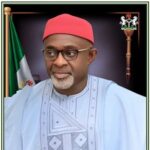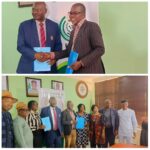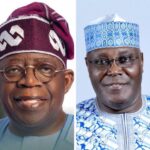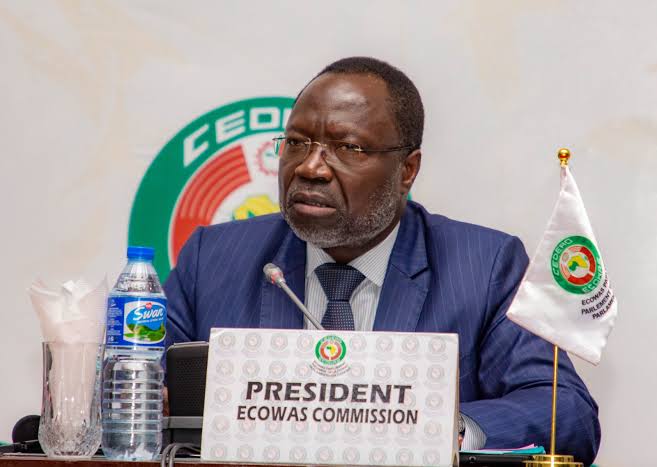By Linus Aleke, Abuja
The President of ECOWAS Commission, Dr. Omar Alieu Touray, on Monday cautioned Burkina Faso, Niger, and Mali, against its decision to leave the Economic Community of West African States (ECOWAS), following ECOWAS insistence on return to democratic rules in those countries.
The three countries had in January 2024, decided in complete sovereignty on the immediate withdrawal from the Economic Community of West African States (ECOWAS).
Announcing their withdrawal from the regional economic bloc, in a joint statement, the three countries accused the regional body of failing to support their fight against terrorism and insecurity, while imposing illegal, illegitimate, inhumane and irresponsible sanctions”.Effort to broker peace between the aggrieved countries seem to be hitting a break wall as the three countries are unwilling to shift position.
Speaking on this subject matter at the opening of the 2024 first ordinary session of ECOWAS Parliament, in Abuja, Touray, said it is clear that disintegration will not only disrupt the freedom of movement and establishment of people, but it will also aggravate insecurity in the region.
More specifically, he said that the withdrawal of the three aforementioned countries will deal a severe blow to security cooperation, particularly in terms of intelligence sharing and participation in the fight against regional terrorism and other joint security initiatives, such as the operationalization of the ECOWAS standby force that the member states’ defense ministers have just agreed to activate, as well as the Accra Initiative and the Multinational Joint Taskforce.
The withdrawal of the three countries, he said could also lead to diplomatic and political isolation on the international stage, as these countries will no longer be able to benefit from bloc support when their citizens or candidates seek international positions within the African Union, the United Nations, and similar bodies.
He added that this withdrawal will also affect travel and immigration conditions for citizens of these three countries, as they will now have to apply for visas before traveling within the sub-region, stressing that citizens of these countries may no longer be able to reside or freely create businesses within the facilities established by ECOWAS and may be subject to various national laws.
“Additionally, these three countries will have to cease using ECOWAS passports, the ECOWAS biometric national identity card, and the ECOWAS “Brown Card” automobile insurance on a regional scale. Economically and financially, the withdrawal of the three member states could lead to the cessation or suspension of all projects and programs implemented by ECOWAS in these countries, valued at over 500 million US dollars.
“It is also worth noting that the two regional financial institutions, namely the ECOWAS Bank for Investment and Development (EBID) and the West African Development Bank (BOAD), have significant investments in these three countries. EBID has 27 projects currently in these three countries, with a total value estimated at around 321.634 million US dollars, of which 38.1 percent are public sector projects and 61.9 percent are private sector projects. The banking portfolio in these three countries represents approximately 22.5 percent of the total bank portfolio in the 15 member states. The three countries have contributed a total of 33.135 million US dollars to the bank’s capital.
“Institutionally, it is worth noting that the withdrawal of the three countries will result in the closure of four ECOWAS regional entities in Burkina Faso, two ECOWAS regional bodies in Mali, and one ECOWAS regional office in Niger. This will also affect the job security of approximately 130 ECOWAS staff citizens of the three countries, distributed as follows: 77 from Burkina Faso; 23 from Mali; and 32 from Niger”. Touray said.
He noted that these are the disastrous consequences of disintegration on the citizens that motivated the decision of the Conference of Heads of State and Government of ECOWAS, under the leadership of President Ahmed Tinubu, to open dialogue with the three countries in order to maintain the unity of ECOWAS, stressing, that is why the Conference of Heads of State also ordered at its last session that the representatives of the people continue to play their role within the ECOWAS Parliament.
Lamenting this lack of cooperation from the three countries, the President of ECOWAS Commission, Dr Touray, said the four transitional countries were invited to send representatives to this legislature, unfortunately, only the Republic of Guinea responded positively to this invitation.
“Inviting the transitional countries to send their representatives to the ECOWAS Parliament was one of the many measures we have taken to involve the transitional countries since the extraordinary summit on February 24, 2024. Other measures include requests for hearings and invitations to participate in sectoral and consultative meetings. Although none of these openings have received a response, my colleagues and I at the commission remain determined to continue reaching out to preserve the unity of the sub-region. As representatives of the people, your role in this process is crucial, and that is why I commend the resolution you took in Kano to involve the various stakeholders from the three countries. I assure you of the full support of the ECOWAS commission for the various steps you are taking. We must be effective and strategic in our engagement,” he said.
The Senate President, Sen. Godswill Akpabio, said, the myriad of challenges in West Africa can be surmounted if the ECOWAS Parliament is galvanized by the spirit of unity, innovation, and an unwavering belief in the subregion’s shared destiny.
Akpabio said that this is needed to transform the region’s collective aspirations into enduring achievements.
Represented by the Deputy President of the Senate and the First Deputy Speaker of the ECOWAS Parliament, Sen Barau Jibrin, the Senate President highlighted the centuries-old history of collaboration among the diverse people of the region.
He said: “The challenges we face are not insurmountable. With unity, innovation, and an unwavering belief in our shared destiny, we can transform our collective aspirations into enduring achievements. In this session, let our conversations be driven by the spirit of partnership and collective ambition. Let us demonstrate that when West Africa stands united, there are no limits to what we can
accomplish. Our diversity is our strength, and our unity is our power. From the ancient empires of Ghana, Oyo, Mali, and Songhai, which flourished through trade and cooperation, to the pivotal alliances forged during the fight for independence, the spirit of unity has always guided our path”.











